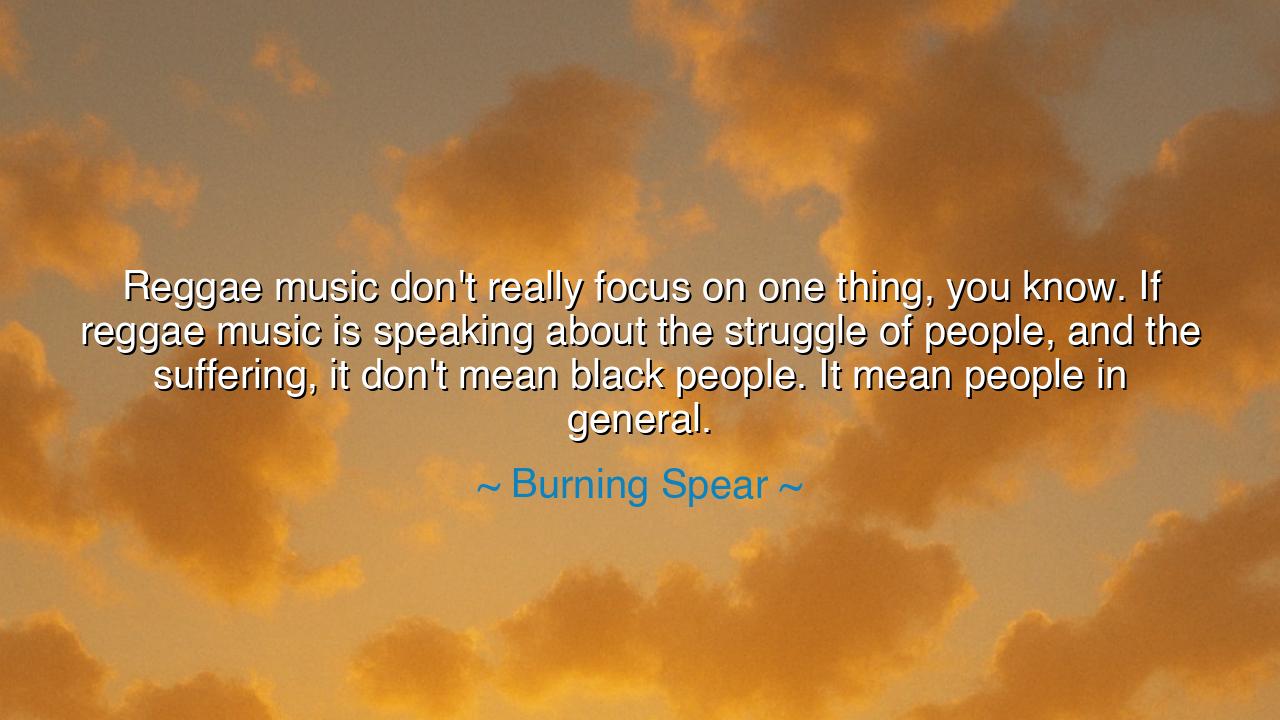
Reggae music don't really focus on one thing, you know. If
Reggae music don't really focus on one thing, you know. If reggae music is speaking about the struggle of people, and the suffering, it don't mean black people. It mean people in general.






The prophet of roots and spirit, Burning Spear, once declared with the fire of truth: “Reggae music don’t really focus on one thing, you know. If reggae music is speaking about the struggle of people, and the suffering, it don’t mean black people. It mean people in general.” These words, born of Jamaica’s hills and Rastafari’s wisdom, remind us that the cry of reggae music is not chained to one tribe or nation—it is the cry of humanity itself. In his voice, we hear the teaching that art born from pain and resilience belongs not to one people alone, but to all who walk through the deserts of suffering.
To say “reggae music don’t really focus on one thing” is to honor its breadth. Reggae was born of rhythm, yes, but also of resistance; it grew from the soil of poverty, oppression, and exile. Yet it did not remain bound to one cause alone. It sings of injustice, but also of hope. It mourns suffering, but also celebrates joy. It is the heartbeat of love, of unity, of the eternal longing for freedom. It is not narrow, but vast—like the ocean from which the island of Jamaica rises, touching every shore with its waves.
When Burning Spear says that reggae speaks of “the struggle of people”, he speaks not only of black liberation, though reggae was born in the fire of colonial struggle and the yearning for African redemption. He expands the vision: suffering is not the property of one people. Wherever there is injustice, hunger, war, or exile, the cry of reggae is present. In this way, reggae becomes universal—it is not merely Jamaican, not merely African, but human. Its rhythm is the drumbeat of the heart, the shared pulse of all people who know sorrow and yearn for deliverance.
History offers testimony. Consider Bob Marley, who sang Get Up, Stand Up not only for Jamaicans, but for every oppressed soul across the world. When he performed in Zimbabwe at the nation’s independence in 1980, his reggae became the anthem of an entire continent. Or recall the voices of the South African anti-apartheid movement, who found in reggae songs both courage and solidarity, though they were thousands of miles away from Jamaica. Reggae proved Burning Spear’s words true: it was not bound by skin, but by spirit.
This universality does not erase the roots of reggae, but magnifies them. For the story of one people’s struggle becomes a lantern for all who struggle. The history of slavery, colonization, and poverty in Jamaica becomes a mirror in which others see their own reflection. In this way, reggae transforms from the music of an island into the music of the world, carrying the truth that suffering knows no borders, and neither does hope.
The lesson, then, is profound: do not confine the struggle of one people as if it belongs only to them, and do not imagine that art born in hardship is meant only for those who share the same heritage. Reggae teaches us to see beyond divisions—to recognize that the chains of injustice bind many, and the light of freedom belongs to all. Its rhythm calls us not to isolate, but to unite, not to narrow, but to expand.
Practically, this means: when you hear reggae, listen not only for its Jamaican roots but for your own story within it. Let its cry for justice remind you of the suffering that still exists in every land. Let its joy awaken gratitude for life even in hardship. And more importantly, let it move you to act—not only for your people, but for all people, for justice that is partial is no justice at all.
So let Burning Spear’s wisdom endure: “It don’t mean black people. It mean people in general.” Reggae is the song of humanity, the pulse of freedom, the anthem of struggle and redemption. It teaches us that pain is shared, but so too is hope. And if we listen deeply, we may find that its rhythm is not only in the drums—it is in the beating of our own hearts, calling us to unity, compassion, and the everlasting fight for freedom.






AAdministratorAdministrator
Welcome, honored guests. Please leave a comment, we will respond soon